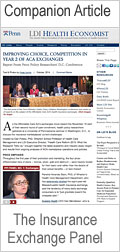HEALTH CARE REFORM IN 2015: WHAT THE RESEARCH TELLS US
Cosponsored by Penn-Wharton Public Policy Initiative (PPI)
and Leonard Davis Institute of Health Economics (LDI)
Photography by Hoag Levins
|
 The one-day "Health Care Reform in 2015: What the Research Tells Us" conference drew health care research and policy experts to the historic Willard Hotel in Washington for discussions on the latest data and insights related to the ongoing implementation of the Affordable Care Act.. . .Click Images to Enlarge
|
 The Willard Hotel is one of the capital's most historic buildings and a long-time gathering spot for capital policymakers and the media that follow them and their issues.
|
 Launched just two years ago, the Penn-Wharton Public Policy Initiative has established its D.C. office and has a growing presence in the capital.
|
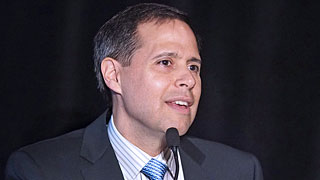 Hosting the conference was LDI Executive Director Dan Polsky, PhD, who called the gathering "a unique event aimed at connecting research with policy by bringing together academics and government and industry officials.
|
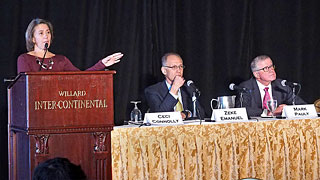 The plenary session was hosted by Ceci Connolly, Managing Director of PwC's Health Research Institute. It featured Ezekiel Emanuel, MD, PhD, MSc, Chair of Penn's Department of Medical Ethics and Health Policy, debating Wharton School professor and health economist Mark Pauly, PhD over the future of employer-provided health insurance.
|
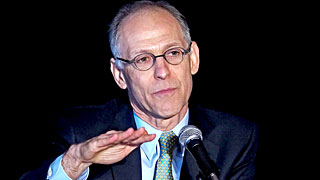 Moderator Ceci Connolly opened the session by asking "Is there a future for employer-sponsored health insurance?" Ezekiel Emanuel, the former White House advisor who helped write the ACA, answered that the health reform law is changing so many things at once that it's not possible to predict which way employers will go as the exchanges evolve and the 'Cadillac' tax hits in 2018.
|
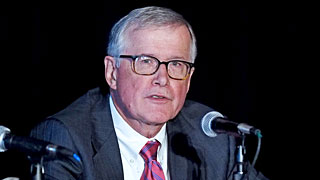 Wharton Professor and nationally renowned health economist Mark Pauly said that under current law employer-sponsored insurance will experience only a modest amount of erosion in the coming years. He elaborated on that by also saying there ought to be changes that would reduce the number of people who get their insurance through the workplace.
|
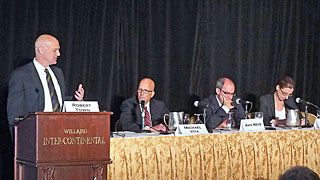 The panel on provider consolidation, integration, ACOs and competition policy was moderated by Robert Town, PhD, a Wharton School Associate Professor of Health Care Managment. He noted that health care providers, insurance companies, physicians and pharmaceutical firms are increasingly concentrated and become more so at a steady pace in their markets and that the FTC has increased its anti-trust enforcement.
|
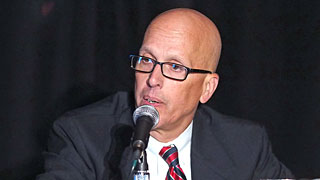 Panelist Michael Vita, PhD, a Deputy Director of the FTC, said the agency's successful anti-trust efforts in health care are the natural extenstion of a sweeping reorganization of its enforcement operations begun ten years ago in the wake of a string of stinging court defeats. Today, the FTC is very active in its anti-trust cases against hospital, physician group and pharmaceutical company mergers.
|
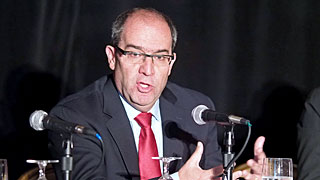 Aviv Nevo, PhD, Professor of Economics and Marketing at Northwestern University and recent former Assistant U.S. Attorney General, said that much had changed in the anti-trust enforcement world. Health care prices have increased and academic studies and federal agencies' work have linked those increases to market concentration. Meanwhile, the federal agencies have "figured out the right analytical framework from which to examine these mergers," he said.
|
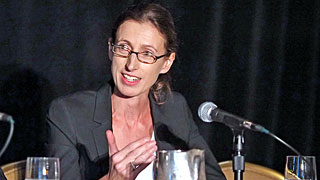 Kate Ho, PhD, Associate Professor of Economics at Columbia on sabbatical at Penn, said there is surprising little evidence to support either the health care firms desire to merge or the federal regulators that want to stop them. There is evidence that vertically integrated systems like Kaiser can foster high quality and relatively low cost. "But," she said, "that doesn't mean that allowing hospital and physician groups in other areas to merge will produce another Kaiser."
|
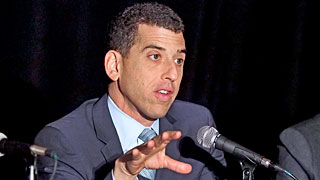 At another panel focused on health insurance exchanges, Avalere Health CEO Dan Mendelson said the ACA marketplaces needed drug-related decision support functions for consumers. This would be a database of drugs that would enable exchange shoppers to quickly find out how any plan is tiering specific drugs as well as how much would have to paid out of pocket for any given drug. This panel is the subject of an extensive companion article.
|
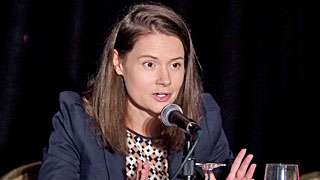 In the insurance exchange panel, Wharton Assistant Professor of Health Care Management Amanda Starc, PhD, explained that her studies of the oldest health exchange -- Massachusetts' -- found that more sophisticated decision support functions caused more consumers to buy generous plans. She also emphasized that there are broad variations in what different demographics of consumers want or need from a web-based insurance exchange.
|
